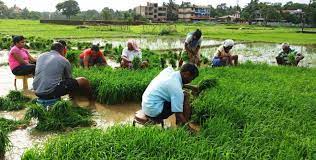3,751 suggestions received from farmer groups and other stakeholders

PANAJI
The long pending ‘Goa State Amritkal Agriculture Policy 2024’ was on Thursday submitted to the government for approval. The policy document comprises 150 pages.
Agriculture Minister Ravi Naik said that the designation of the Goa State Agriculture Policy as the Goa State Amritkal Agriculture Policy, 2024, is a strategic initiative aligning with the vision of Amritkal, aiming towards India’s centenary of Independence in 2047.
“This period symbolizes a transformative era, during which India endeavours to become a fully developed nation. The alignment of state policies with Amritkal’s vision is crucial for comprehensive progress and development across all sectors, including agriculture, pivotal to India’s economy and societal fabric,” he said in a statement issued.
The State government had in May 2023 constituted the committee to draft the State Agriculture policy. A total of over 3,751 suggestions from individuals, farmers groups, village panchayats and other stakeholders were received for the policy at the drafting stage.
Based on the suggestions, the Committee had identified focused areas like agriculture and horticulture development, integrated farming, land, soil and watershed development, khazan land, fertilizer, nutrient, pesticide and pest management, agro tourism, organic and natural farming, agriculture export, storage and warehousing, climate and environment, agriculture in school curriculum and research.
The Minister said that as per the administrative norms, the policy document, under embargo until its approval and is presented before the cabinet. Subject to its approval, it would be notified in the official state gazette, becoming a public document available in Konkani and Marathi, he said.
Naik highlighted that it was former CM late Manohar Parrikar who took the initiative to prepare the State Agriculture policy and for which a committee was constituted on August 9, 2012. However, following the resignation of the chairman Adv Narendra Sawaikar in 2014, the committee became defunct.
“This policy has been deduced by involving thousands of people and farmers in an open, liberal, transparent, and democratic, through participatory public policy-making process,” he said.